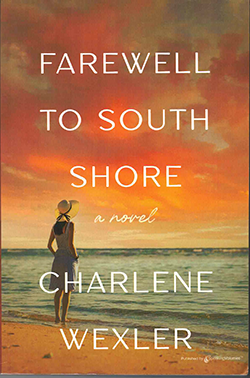Farewell to South Shore by Charlene Wexler; Naples, Florida: Speaking Volumes, LLC © 2024; ISBN 9798890-220721; 309 pages; $18.95

 SAN DIEGO – This novel reads like a first-person memoir tracing a woman’s life from a 1950s sheltered girlhood in a multi-family residence, surrounded by her warm, noisy, religiously traditional Jewish family, to an adult career fighting for women’s and LGBTQ rights in the decades that followed.
SAN DIEGO – This novel reads like a first-person memoir tracing a woman’s life from a 1950s sheltered girlhood in a multi-family residence, surrounded by her warm, noisy, religiously traditional Jewish family, to an adult career fighting for women’s and LGBTQ rights in the decades that followed.
Sherrie Paul, the narrator in this easy-to-read work, tells of the death of her mother, whom she learns wasn’t Jewish; a marriage and divorce; raising two children as a single mother; a career as an attorney; a death from AIDS; trying to learn how to use computers; and finding a man she could really love.
Typically, novels have some conflicts that need to be resolved, but although this one hints of several conflicts, they are papered over. For example, the fact that her mother was a Christian who pretended to be a very “Reformed” English Jew in order not to upset Sherrie’s grandparents was a situation that could have been deeply explored, but it wasn’t.
In Orthodox circles, that fact would have meant that Sherrie herself wasn’t Jewish, though she grew up among her extended, kosher-observant family. Furthermore, her children would not have been halachically Jewish. Rather than exploring this conflict and what impact it might have had on Sherrie’s self-identification and upon the rest of her family, author Wexler simply had her character keep her mother’s secret.
When cousin David came out as a gay man, the family’s reaction similarly was muted by the author. Anti-gay prejudice was rife in the environment, but the issue was all but ignored within the confines of the large family. When AIDS threatened David’s health, there were no big scenes, no revelations. It was all so matter of fact.
The gist of the story is that Sherrie gradually becomes more independent of her lovable relatives, her nasty, domineering husband, and, coming into her own as an attorney, advocates for abused women.
If this novel is a roman-a-clef, then perhaps Wexler didn’t want to hurt the feelings of people who would recognize themselves within it. However, such an approach left this reader wondering if there was much more to the story.
In the final analysis, Farewell to South Shore is readable, nostalgic, but far from memorable.
*
Donald H. Harrison is publisher and editor of San Diego Jewish World.
roman-a-clef is added to my vocabulary but probably will never be used.